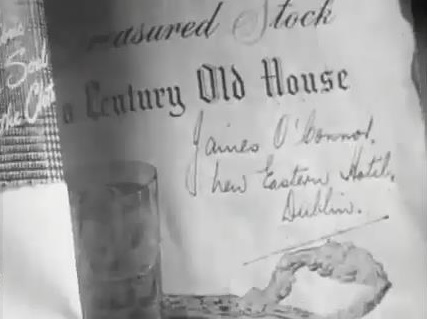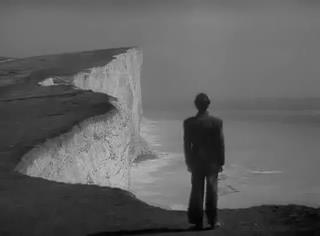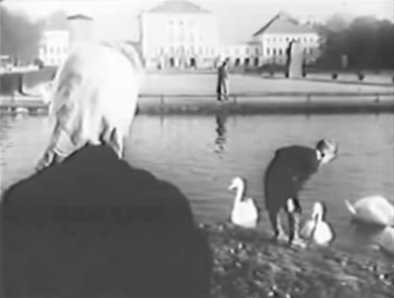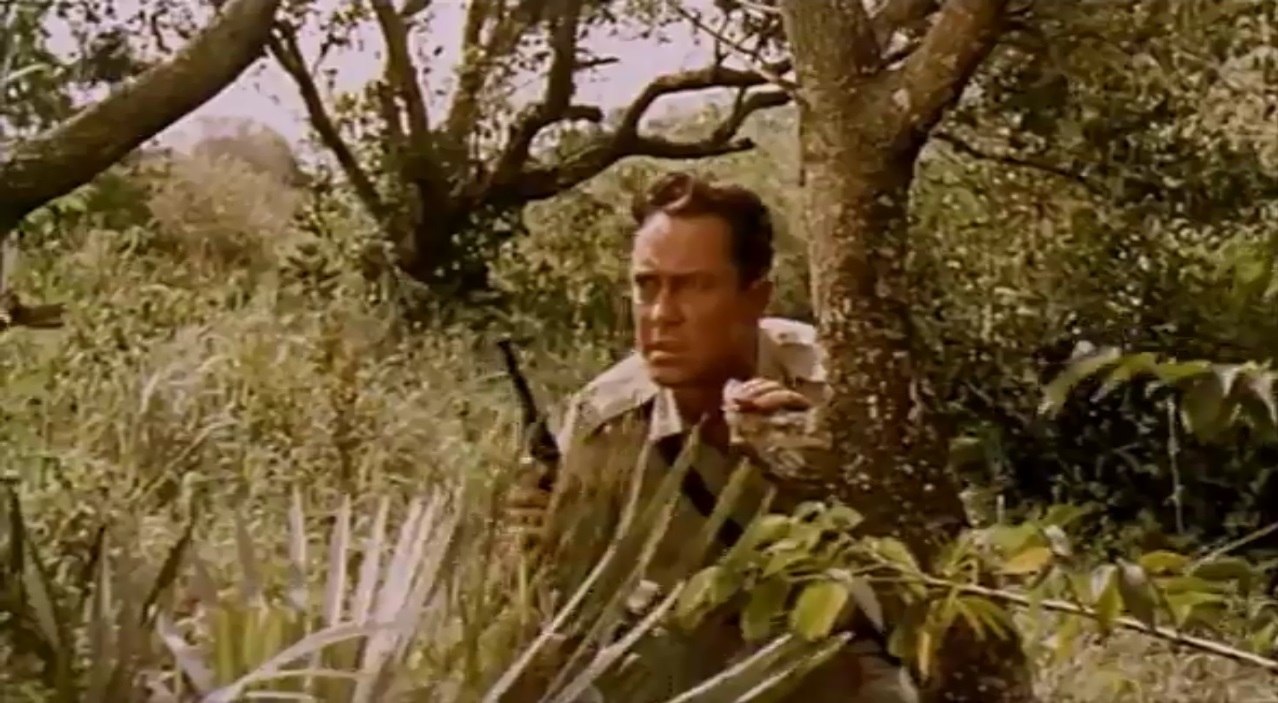Night Boat
to Dublin

Swedish
scientist, working on “atomic explosive, there’s no answer to that one,” kidnapped by Nazis. “That’s
all right, old boy, she’s at my place, in bed.” The Irish Free
State is neutral. “Amazing. And he still thinks he’s working for
the government.”
“Yes,
it’s surprising what one can do with a few forged credentials,
isn’t it, Grant?” A matter of surprising delicacy, expressed with great
care and attention and something of Hitchcock’s The 39 Steps here and there, Donat for Newton’s softness of
manner as the man from Military Intelligence, one of them. A very brutal
affair, nonetheless. Superbly directed as a matter of course, patiently, the
great news waits for a bit of counterespionage to work things out.
Britmovie,
“the film’s tense action is crisply-photographed by Czech
cinematographer Otto Heller but Lawrence Huntington’s off-paced direction
fails to capture the espionage excitement.” TV Guide, “plodding story... suffers from serious miscasting
and off-paced direction.” Hal Erickson (All Movie Guide), “if nothing else...” Halliwell’s Film Guide,
“generally watchable”.
Wanted for Murder
Britten
signally borrowed, to all appearances, and completed Spoliansky’s
fragmentary song-theme “A Voice in the Night” for “The Sick
Rose” in his Serenade.
Whilst
rowing in Hyde Park, the title character says this, “you know, I’ve
always wondered what that little island is like.” London directly after
the war, splendidly filmed.
Bosley
Crowther of the New York Times had simply no idea what was meant,
“completely lacking in turbulence or suspense.” Unhappily, James
Agee was in the same case, “a pleasant, unpretentious thriller of the
second or third grade, with oddly contradictory streaks of good and crude
directing.” Halliwell’s Film Guide, “an interesting
curiosity.”
Just
the sort of thing John Ford had in mind when he made Gideon of Scotland Yard
(Gideon’s Day).
The Upturned Glass

It
will be understood very easily as another consideration of themes developed by
Noël Coward in Blithe Spirit (dir.
David Lean) and Anthony Asquith in Libel,
which is to say the historic occurrence of the world wars from a British
perspective.
Huntington’s
exceedingly difficult pidgin is the rare bird neatly dropped by his text but
wonderfully hard to realize except in the terms of precisely this realization,
an isolated example of the high art required to formulate an extremely abstruse
proposition, let us say even on a theoretical basis.
Dangerously
the notion could be paraphrased, and here we have Peter Yates and Joseph Losey
to the rescue with Murphy’s War
and Figures in a Landscape respectively
on perishing with your enemy or transcending him.
Hitchcock
would seem to have been especially struck by this, and found notable use for
the material most particularly on television in such works as
“Together” (dir. Robert Altman) and “One More Mile to
Go” (directed by himself) for Alfred
Hitchcock Presents. The extraordinarily troublesome murder is of course a
feature of Torn Curtain.
Variety, “interminable narrative... unnecessary
flashbacks”. Allen Eyles (Radio
Times), “heavily contrived, i.e.
ridiculous.” TV Guide, “a
bad title didn't help the screenplay
of this heavy drama...” Hal
Erickson (All Movie Guide), “a virtual compendium
of late-1940s British melodramatic devices.” Halliwell’s Film
Guide, “rather pointless psychopathology”.
Cf. Siodmak’s The Suspect.
Excellent Bernard Stevens score, Reginald H. Wyer cinematography, the lot.
The Franchise Affair
The construction
will be recognized as that of Wyler’s These Three, it is of
negligible interest, serving only to deliver up certain images that tell the
tale of Kristallnacht and Jew-baiting in an English village (Dreyfus and Oscar
Slater are mentioned), and that is still not the point.
The accuser has a
story of forced servitude and kidnapping and assault, the accused have no
defense because there is no evidence and so forth, but since the crime never
took place, where has the accuser been?
The truth comes
out in court.
If there were
teacups and Englishmen and “literate talk” it was hell to Bosley
Crowther of the New York Times, he saw no point in Huntington’s
film, “miserably lacking in distinction of any kind.” Tom Milne (Time
Out Film Guide) has exactly the same view, “strangled”, he
calls it. Halliwell’s Film Guide, “rather too mild.”
Michael
Denison’s performance, which Milne dispraises, suggests especially at the
beginning an English James Stewart.
Eight Witnesses

Grand drama of
the scientist escaped from Soviet hands who winds up in a Braille reading room
at Vienna, murdered.
Cf.
Griffith’s Edgar Allan Poe,
Castle’s Texas, Brooklyn &
Heaven, Schepisi’s The Russia
House.
Vd.
also the touching story of Browning’s “Pauline” by Rossetti
“found and transcribed... in the reading room of the British
Museum.” A shootout among the shelves, “in the middle
Minerva.”
“You know,
there’s a rumor going around that you know a little something about
higher mathematics.”
“That’s
strictly a rumor.”
Halsted Welles
script, Pabst’s cinematographer (Komödianten,
Paracelsus), Lang’s and
Lorre’s composer (Frau im Mond,
Der Verlorene).
Death Drums Along the
River

Diamonds and
medicine (cf. Reed’s The Third Man) and murder in a fictional
West African colony very like British Gambia so please you (“we don’t
get quite so much information now
that the French have left”) about to attain independence, a profound
analysis that nevertheless is not altogether the express point of it, really,
when all is said and done. Question of extraction merely, or subtraction,
rather than a divvying-up or on the contrary a dispensing of blessings all
round (Dr. Weiss or Mr. Hunter the Yank, the merchant Pearson with his hand in
everything, Dr. Schneider). A sham death, then one in earnest, the second
death...
Huntington’s
penultimate film (Sanders in U.S., vd. Zoltan Korda) exhibits the
perfection of his art ideally, and that is still not the point.
Rather it is to
create, by laboring on the screenplay so that its fiendish difficulties are
self-contained, a certain freedom on location so that the cinematography by Bob
Huke establishes a vision of Africa comfortable and familiar, native in a word.
This quite remarkable achievement will be understood as a very proper response
to Cukor’s Bhowani Junction in
exactly the right spirit, furthermore.
Tony Sloman (Radio Times), “strangely
appealing”.
The Vulture
A reconsideration
of the themes in Wanted for Murder, which is the story of a killer, son
of Willy, “the happy hangman”.
The Vulture shows how the antiquarian Königlich supplies
himself with power for a “nuclear transmutation” involving his
putative ancestor Francis Real, dead these two hundred years, the
Spaniard’s pet vulture was buried alive with him and upsets the
experiment at Tolferro in Cornwall (cp. The Fly, dir. Kurt Neumann).
The screenplay is
constructed on several elements of Easter Island culture, the “bird
man” among them, and most importantly that an evildoer goes after death
to dwell in a cave and prey on the living, also there is a question of clan
warfare, the manutara is mentioned.
Real is thought
to have visited Easter Island on his travels.
Howard Thompson
of the New York Times dismissed it as a “flaperoo” along
with Freddie Francis’ The Deadly Bees. Halliwell’s Film Guide,
“incredible nonsense.”